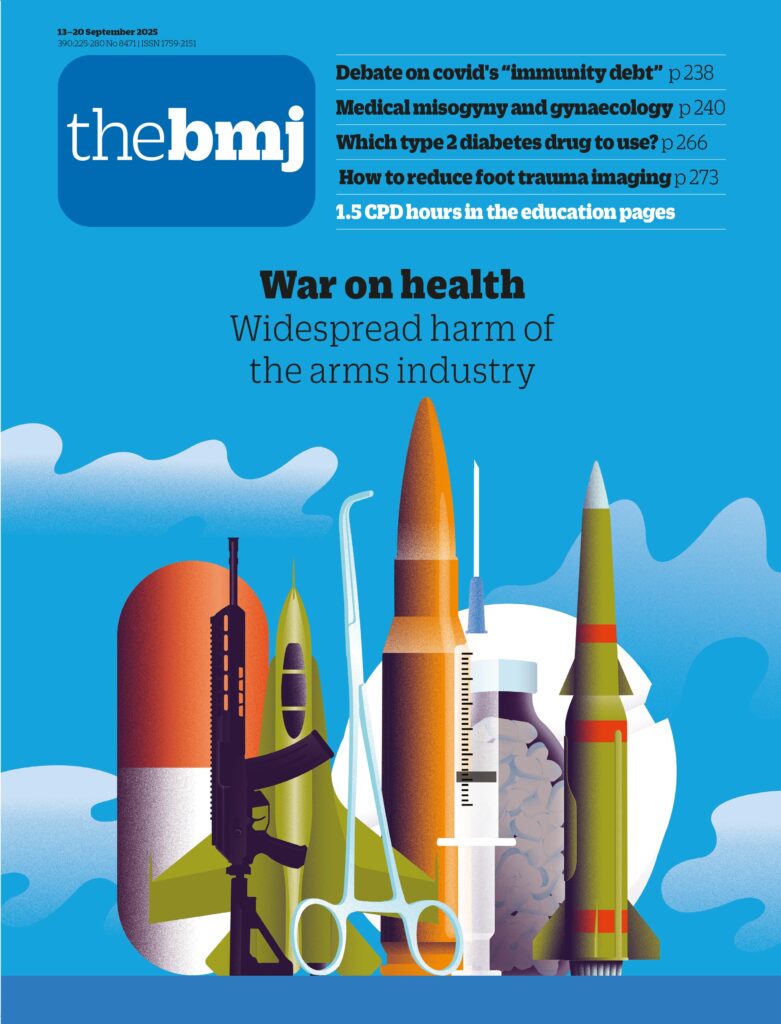The NHS 10 year health plan for England set out a bold vision for the health system with a renewed focus on putting “patient choice, voice and feedback at the heart of how we define and measure quality.”1 Penny Dash’s review of patient safety, published only days later,2 argued that the quality agenda over the past 10 to 15 years has been dominated by concerns about safety. Other key elements of quality care—clinical effectiveness and patient experience—have been relatively neglected.
Dash’s review found thousands of reports, recommendations, and many new agencies tasked with monitoring and improving healthcare quality but detected little evidence of improvement. To tackle this, the 10 year plan proposes a national focus on patient experience, including expanding the collection and reporting of data via the NHS App. Yet bodies championing public engagement locally are to be closed down, which risks weakening the impact of patient voices.
Capturing patient perspectives
One common theme of patient safety reports is that in almost every serious case of failure, patients and their families had raised concerns long before the problems reached public attention. They often needed to push for their concerns to be taken seriously, sometimes for years, and at a terrible human cost. Reviews have repeatedly concluded that failures could have been avoided if patients and families had been listened to in the first place.
The government’s plan to tackle the healthcare system’s tendency to neglect patient concerns involves streamlining regulatory bodies—aiming for better coordination and more effective processes—and encouraging patients and staff to access routinely collected healthcare quality indicators. Patients will be invited to contribute to quality datasets through regular feedback and can use these findings to inform their treatment decisions and choice of provider. The plan refers to this process as “transparency, voice, and choice.” Cynics say that we’ve seen all this before; they have a point, but previous efforts to inform and involve patients in quality improvement have been weak.
The 10 year health plan seems to be calling for what’s known as a learning health system—an approach to continuous quality improvement in which data that are collected routinely in clinical care are analysed, presented in an accessible way, and acted on.3 To be truly person centred and actionable, it will be crucial that the datasets include information on patients’ health status, experiences, and outcomes.
The NHS is awash with clinical and administrative data, but several barriers prevent the data being used to improve care.4 Progress is being made to overcome these obstacles, but there are still important gaps when it comes to collecting and responding to patients’ perspectives on care. For example, most data collections target specific services rather than being organised around patients’ perspectives: this can mean that patients’ experiences of care transitions are overlooked.
It will be challenging to meet the 10 year health plan’s 2029 deadline for patient reported outcome and experience measures (PROMs and PREMs) to be “used universally” and made available via the NHS app.15 But there are useful international examples to build on, including an ongoing European programme aimed at developing standardised measurement approaches to capture and record patients’ experiences electronically.6
Closure of Healthwatch
Raising concerns can take confidence and courage. To ensure high quality care for all, we must value and amplify voices that might otherwise go unheard. Given this, it is surprising that Healthwatch has been caught up in the “bonfire of the quangos.”7 The closure of Healthwatch’s 153 local branches will end England’s 50 year tradition of having independent bodies with statutory duties to promote patient and public voices in local areas. Community Health Councils were the first of these bodies to be established, in 1974, and, most recently, Healthwatch was established in 2013. These organisations have taken different forms and held varying powers, but all have offered at least some independence around patient voice and engagement locally.
In the future envisioned in the government’s plan, patient voice is amplified not through independent support but by NHS organisations and systems—including integrated care boards, which are facing their own budget cuts. This is a shame because it is likely to reduce system capacity for engagement locally and because the independence of advocates is important in reassuring patients whose poor experiences have dented their trust in the health service. The abolition of Healthwatch looks like a backwards step.
For the plans to succeed and win people’s trust, it will be essential to develop ways for people who lack the knowledge, skills, and confidence to advocate for themselves to feel engaged and listened to. People who most need support, including those with multiple long term conditions, have the poorest experiences and outcomes—and they may not feel comfortable raising concerns directly with those responsible for their care.8 Digital technologies offer exciting opportunities to improve services, but they also risk further disadvantaging marginalised people. Simply relying on large datasets and apps will not be sufficient. Focused, local support and action will be needed, ideally from independent sources close to local communities and attuned to diversity—as the best of the local Healthwatch groups tried to do. This is essential to give everyone a voice in the “healthcare revolution” promised by the plan.
Footnotes
-
Competing interests: Both authors are representatives of Picker Institute Europe, a health and care research charity that receives funding to gather patient feedback in the NHS.
-
Provenance and peer review: Commissioned, not externally peer reviewed.
-
AI declaration: The authors declare that the text and opinions within this article are wholly their own work; there has been no use of artificial intelligence in the preparation of the article.

